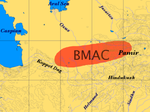The Vakhsh culture is a Bronze Age culture which took place around 2500-1650 BC, as shown by radiocarbon dates, and flourished along the lower Vakhsh River...
7 KB (773 words) - 18:22, 27 April 2024
cultures and the Central Asian oasis cultures (Bishkent culture and Vakhsh culture). In the initial Sintashta-Petrovka phase, the Andronovo culture is...
64 KB (7,136 words) - 05:31, 21 November 2024
The Karasuk culture (Russian: Карасукская культура, romanized: Karasukskaya kul'tura) describes a group of late Bronze Age societies who ranged from the...
31 KB (3,313 words) - 22:05, 16 November 2024
thresholds. -2000 EBLA MARI ASSYRIA Jeul- mun Andronovo culture Sintashta culture BMAC Vakhsh Ancient Northeast Asians Tarim mummies Okunev Elunino Glazkov...
46 KB (4,908 words) - 14:33, 20 October 2024
The Mal'ta–Buret' culture (also Maltinsko-buretskaya culture) is an archaeological culture of the Upper Paleolithic (generally dated to 24,000-23,000 BP...
34 KB (2,912 words) - 17:48, 11 November 2024
to 700 BC. -2000 EBLA MARI ASSYRIA Jeul- mun Andronovo culture Sintashta culture BMAC Vakhsh Ancient Northeast Asians Tarim mummies Okunev Elunino Glazkov...
59 KB (6,960 words) - 22:14, 28 August 2024
Pazyryk culture (Russian: Пазырыкская культура Pazyrykskaya kul'tura) is a Saka (Central Asian Scythian) nomadic Iron Age archaeological culture (6th to...
21 KB (2,047 words) - 18:27, 23 October 2024
The Tashtyk culture was a Late Iron Age archaeological culture that flourished in the Yenisei valley in Siberia from the 1st century CE to the 4th century...
12 KB (1,032 words) - 14:58, 4 November 2024
culture. Vakhsh culture Chust culture Yaz culture Mallory, J. P.; Adams, Douglas Q. (1997). "Bishkent culture". Encyclopedia of Indo-European Culture...
2 KB (103 words) - 16:44, 15 February 2024
Afanasievo culture, or Afanasevo culture (Afanasevan culture) (Russian: Афанасьевская культура Afanas'yevskaya kul'tura), is an early archaeological culture of...
62 KB (6,056 words) - 22:17, 14 November 2024
Siberian Ice Maiden (section In popular culture)
in a kurgan belonging to one of the Pazyryk burials, from the Pazyryk culture in the Republic of Altai, Russia. It was among the most significant Russian...
13 KB (1,580 words) - 23:12, 24 October 2024
Stacul, and other scholars argue that this culture is also not related to the Bishkent culture and Vakhsh culture of Tajikistan. However, Kuz'mina argues...
20 KB (2,267 words) - 16:17, 15 August 2024
culture refers to the Saka culture of the Turan-Uyuk depression around the Uyuk river, in modern-day Tuva Republic. This period of Scythian culture covers...
9 KB (939 words) - 12:11, 7 July 2024
Turan. The Arzhan culture is considered as forming the initial Scythian period (8th–7th century BC), and precedes the Pazyryk culture. The remains of Arzhan...
36 KB (4,025 words) - 22:21, 24 October 2024
Mal'ta–Buret' culture Yamnaya culture Afanasievo culture Sintashta culture Vakhsh culture Bactria–Margiana Archaeological Complex Saka Andronovo culture Tagar...
22 KB (2,178 words) - 17:09, 5 November 2024
Mal'ta–Buret' culture Yamnaya culture Afanasievo culture Sintashta culture Vakhsh culture Bactria–Margiana Archaeological Complex Saka Andronovo culture Tagar...
4 KB (443 words) - 01:37, 8 November 2024
The Tagar culture was a Bronze Age Saka archeological culture which flourished between the 8th and 1st centuries BC in South Siberia (Republic of Khakassia...
20 KB (1,924 words) - 08:03, 26 October 2024
Mal'ta–Buret' culture Yamnaya culture Afanasievo culture Sintashta culture Vakhsh culture Bactria–Margiana Archaeological Complex Saka Andronovo culture Tagar...
6 KB (651 words) - 07:43, 12 September 2024
91°41′14″E / 46.128186°N 91.687306°E / 46.128186; 91.687306 The Chemurchek culture (Ch:切木尔切克, Qièmùěrqièkè; Ru: Чемурчекская культура), also called Khemtseg...
25 KB (2,658 words) - 01:20, 21 April 2024
cultures in the region, such as the Andronovo culture, Bishkent culture, the Swat culture and the Vakhsh culture, and the earlier Corded Ware culture...
9 KB (885 words) - 19:13, 30 August 2024
Neolithic Jeitun culture. It is named after its main site of Anau, Turkmenistan. The Namazga culture was contemporary to the Anau culture. Pottery similar...
7 KB (834 words) - 15:18, 1 January 2024
sovetskij period, su Parthica 5, 2003, p. 3–13. 2003 Invernizzi A., «The culture of Nisa, between steppe and empire», After Alexander-Central Asia before...
9 KB (788 words) - 14:53, 29 October 2024
Bactria–Margiana Archaeological Complex (BMAC) Indo-Iranians Vakhsh culture Bishkent culture Avestan period "Yaz Tepe". Brill Reference. Koninklijke Brill...
26 KB (3,063 words) - 22:18, 29 July 2024
Mal'ta–Buret' culture Yamnaya culture Afanasievo culture Sintashta culture Vakhsh culture Bactria–Margiana Archaeological Complex Saka Andronovo culture Tagar...
18 KB (1,265 words) - 12:39, 12 November 2024
*ʔɑ-ɡiɪ-ɳˠiɪ standard: Āqíní). Ārśi was bordered by related Tocharian cultures, many of which also spoke related languages: Kuča (or Kucha), Gumo (later...
22 KB (2,318 words) - 18:04, 1 November 2024
Mal'ta–Buret' culture Yamnaya culture Afanasievo culture Sintashta culture Vakhsh culture Bactria–Margiana Archaeological Complex Saka Andronovo culture Tagar...
19 KB (2,448 words) - 16:41, 19 September 2024
Saka (redirect from Saka culture)
of the wider Scythian cultures, through which they ultimately derived from the earlier Andronovo, Sintashta and Srubnaya cultures, with secondary influence...
198 KB (21,810 words) - 13:30, 11 November 2024
Kokel Culture (1st-5th centuries CE) is a post-Xiongnu culture, from Southern Siberia, in what is now the modern-day Tuva Republic. This culture is located...
5 KB (541 words) - 10:09, 17 July 2024

























